polity not piety™
Yes, that’s a “trademark” symbol there. Why not? I continue to tell people that I came to the rabbinate out of “polity” not “piety”. My involvement was as a community organizer. A quick check on Google indicates that I’m nearly the only person to have used it… and, at that, significantly more frequently.
nathan hurvitz
Our father died 25 years ago today (29 Iyyar 5746). He was only 71. He had a weak heart from rheumatic fever. And he lead a stressed life as a “Type A” Personality (though while he could be hostile, at times, he did not express “free-floating hostility”). And then at 41 he had a massive heart attack… followed by a couple more in the next few years. Were it not for the fact that this happened in the late ‘50s and that he had a weakened heart to begin with, he would likely have been a candidate for coronary artery bypass surgery. But life did not work that way. Instead, he lived the next 30 years, a full, but careful life.
Nate Hurvitz grew up in Cleveland, OH, in the “first area of settlement” (oddly enough, I thought this was a commonly used sociological phrase, but I can find nothing that explains the phrase on the Web). His parents had come to the States from Chernigov, Ukraine, Pale/Settlement via Hamburg, Germany on the Printz Adalbert which arrived at Philadelphia, Pennsylvania on April 14, 1914. (How Hillel Gurewitz and Fayge Brinn traveled from Cernigov to Hamburg, I never learned.) In Cleveland, his parents were blue-collar workers who identified as Jews and extreme leftists, and internationalists. Hillel, now Harry, sang in the choral group of his Jewish workers’ association. Fayge was a seamstress and took in piecework. Nate’s first language was Yiddish. In fact, he did not speak much English until he began public school, and, even when he was in his early thirties, he thought the German word for “old woman” was “alte yiddeneh”. Nate was 14 years old when the Great Depression began. During the 1930s, as the family lore has it, Nate, a good speaker, was able to draw a crowd while orating from a soapbox. He would do this in front of a house in foreclosure where the owner’s goods were being removed. As the crowd gathered listening, others would be busy moving the objects back into the house. But, Nate wanted to be a writer, not an agitator.
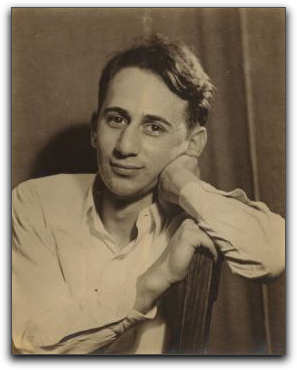
nate hurvitz the writer
on creativity
Dad would have agreed with Einstein:
Imagination is more important than knowledge. Knowledge is limited. Imagination encircles the world.
Dad wrote poems, plays, songs, short stories.
the word (words & music by nathan hurvitz)
[audio:http://www.davka.org/wp-content/uploads/2011/06/TheWord.mp3]
I have many slips of paper on which he wrote; slowly I have begun digitizing them so that our broader family can have access. He also wrote numerous articles, both in his professional field and in areas of inquiry that engaged him.
Though he died 5 years before it launched in 1991, he would have loved the Web. He often used web imagery when talking with us about learning, a simile I now use with our children:
Learning is like creating a fishing net or a spider’s web. The more you weave into it the more it is capable of catching.
He would also say:
Don’t let college interfere with your education.
His creativity led him to work in various media.
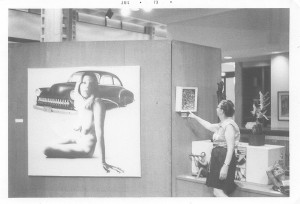
faye hurvitz with one of nate hurvitz’s creations at barnsdall art exhibit, los angeles 1973; photo by nate
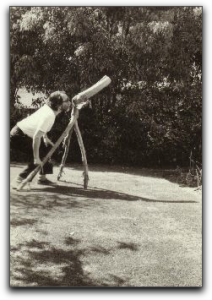
nate the sculptor/astronomer
I’m ahead of my story
Even though he continued to write all his life, and had projects on which he was working when he died, Dad was never able to make a living from his writing. On his return from his “all expenses paid tour of Europe dressed in green” he developed an intense interest in Jewish history and life… especially the life of the destroyed communities of Eastern Europe from which his parents had come. He worked, not as a writer, but as a social worker in the Jewish community and then in private practice as a marriage and family counselor. He and our mother collected artifacts that depicted the life of the working-class Jews of Eastern Europe. (He used to joke that this was our yerushe ירושׁה (inheritance).)
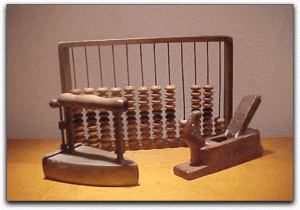
part of our (physical) inheritance
After Dad died, Mom arranged to give their collection of graphics (woodcuts, lithographs, and etchings)to the Magnes Museum in Berkeley, California which exhibited the collection
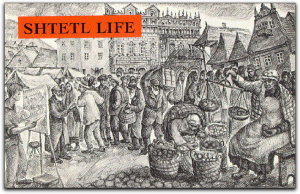
shtetl life brochure
and produced a catalog of it.
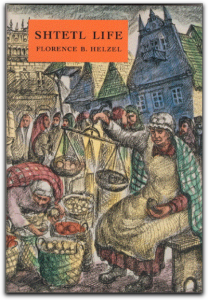
shtetl life catalog (front)
nothing alien
Dad was a life-long atheist, and though he never read Rosenzweig (preferring historians to philosophers), he would likely have agreed with the paraphrase of Terence attributed to him (Franz): “nothing Jewish may be excluded as alien”. Dad was committed to the survival of the Jewish people. Even during his years as an Internationalist (as contrasted with being a Zionist), he and Mom sent me to Habonim summer camp and encouraged my participation in Zionist youth activities. As an atheist Jewish family, we observed Shabbat in our home with candle lighting and its blessings, kiddush, and motzie. When Dad’s colleagues would join us for Shabbat dinner they would wonder why “Natie Hurvitz the atheist” was saying the blessings. He responded by saying that:
These are the folkways of our people. As the world turns toward darkness, it has been the role of the Jewish people to light candles in the dark. By doing so we identify ourselves with Jews everywhere and throughout history who have lit their candles.
His intense commitment to the Jewish people’s survival, possibly blinded him in ways that caused him pain, and likely shortened his life even more than the physical problems that he refused to allow to limit him.
but tweeting #torah?
How did the son of Nathan Hurvitz, the Yiddishist Secularist Internationalist Atheist, become a rabbi encouraging people to do this:
”Twitter Torah to the top” in the “cloud” as it appears above #Sinai for #Shavuot.
first: polity
With the world’s awareness of the “Facebook Revolution” & “Twitter Revolution” in Moldova as well as in Iran, Tunisia, Egypt and other parts of the Arab World, I wonder: can the Jewish Community use Twitter as a community organizing tool. Can we “Tweet #Torah to the Top”? Can we use this it as an “organizing project”, a test to see if something more consequential than Justin Bieber, can draw people’s attention.
As MyJewishLearning.com expressed it recently in its daily e‑newsletter called “Jewniverse”:
The project’s immediate goal is to make “Torah” one of Twitter’s most-talked-about topics.
I would call that a worthwhile goal in and of itself.
This effort “democratizes” Torah. Everyone can share a thought about Torah:
- Bar and Bat Mitzvah students could be encouraged to tweet a thought or two about their Torah Portion.
- Confirmation students could be encouraged to tweet a thought or two about the Ten Commandments (as well as the Torah portion from their Bar or Bat Mitzvah).
- Any adult education class could tweet their favorite Psalm, Prophetic thought, Rabbinic maxim.
- Anyone can tweet a thought about: what it means to be commanded; what “revelation” means in a world of information overload.
- In 5770 Rabbi David Levy of Succasunna prepared a tweet for each of the Parshiot. I know that some people write haiku, others write limericks. These short forms often fit quite well as tweets.
- If you have sermons that are online, shorten the URL using a service such as is.gd and add that short URL to a phrase that describes the sermon’s theme.
I’m interested in this as a once-a-year activity, a sort of “pilgrimage” or “gathering of the tribes”. After all, Shavuot is one of the three pilgrimage festivals. When you’re at the “be-in” unusual mixes occur. I want to see what happens. On previous occasions (this is the third year) I’ve “met” people who have been interesting to follow (which means “learn from/with”).
As part of this project, I wondered: “How does an idea go viral?” Social scientists have studied the phenomenon. Some Twitter users have been able to fool the world about certain actual events such as
Thinking bin Laden Watched The IT Crowd and Big Bang Theory. And so, I’ve mentioned:
In fact, on @TheDailyShow @billycrystal told Jon Stewart “Jews should tweet.” Do you think he means “#Torah to the Top”? http://is.gd/nuryZj
Please join us if you have a Twitter account. If you have a Facebook account, you can “join” the event.
then: piety:
However, MyJewishLearning.com takes the idea further, and in a very positive manner. (Beyond: “I mean, like, who cares if you can make #Torah “trendy” for a day… doesn’t that seem to cheapen Torah?”)
But the larger goal is to remind us how inspirational the Torah can be—even if you’re reading it 140 characters at a time.
From all of these perspectives, I’m sure that Dad would have thought this a valuable activity.
and beside that…
both in relation to Dad and Torah:
All his life, Dad worked for a nicer and better world. He shared those values with his children who carry on his (and Mom’s) efforts. Though Dad rarely wore a lapel button (Mom did, she had a few favorites), he would definitely agree with the sentiment expressed in this one. (The English is: “a nicer/prettier and better world”.) He would also concur that this thought is at the core of Torah.
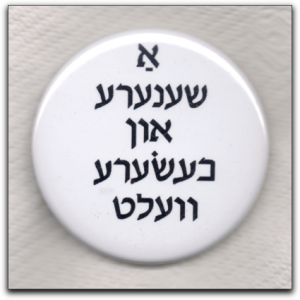
א שענערע און בעשׂערע וועלט
| Date: | 2000s |
| Size: | 5.71 |
| Pin Form: | clasp |
| Print Method: | celluloid |
| Text | א שענערע און בעשׂערע וועלט |
your lapel buttons
Many people have lapel buttons. They may be attached to a favorite hat or jacket you no longer wear, or poked into a cork-board on your wall. If you have any laying around that you do not feel emotionally attached to, please let me know. I preserve these for the Jewish people. At some point they will all go to an appropriate museum. You can see all the buttons shared to date.

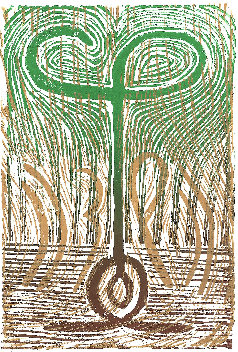
Thank you so much for sharing a piece of your father with us. He was a handsome man with kind eyes.
Thank you Frume.